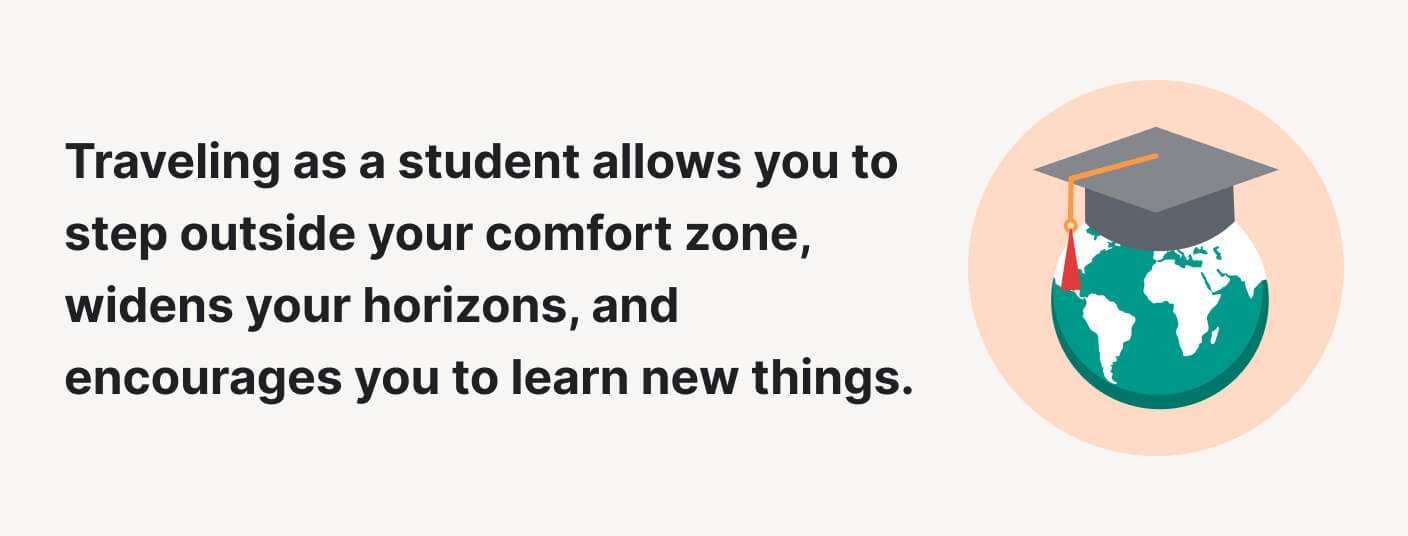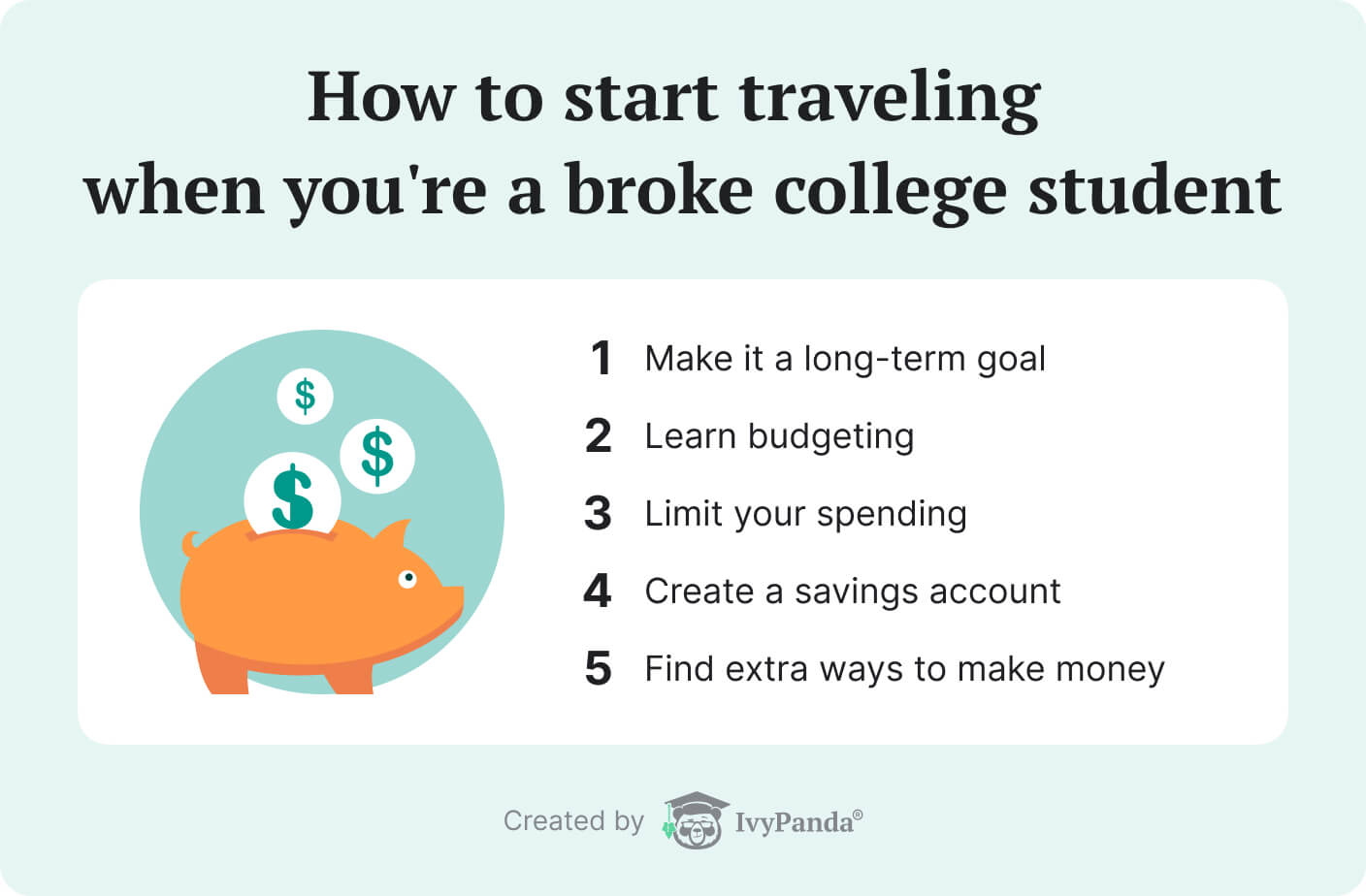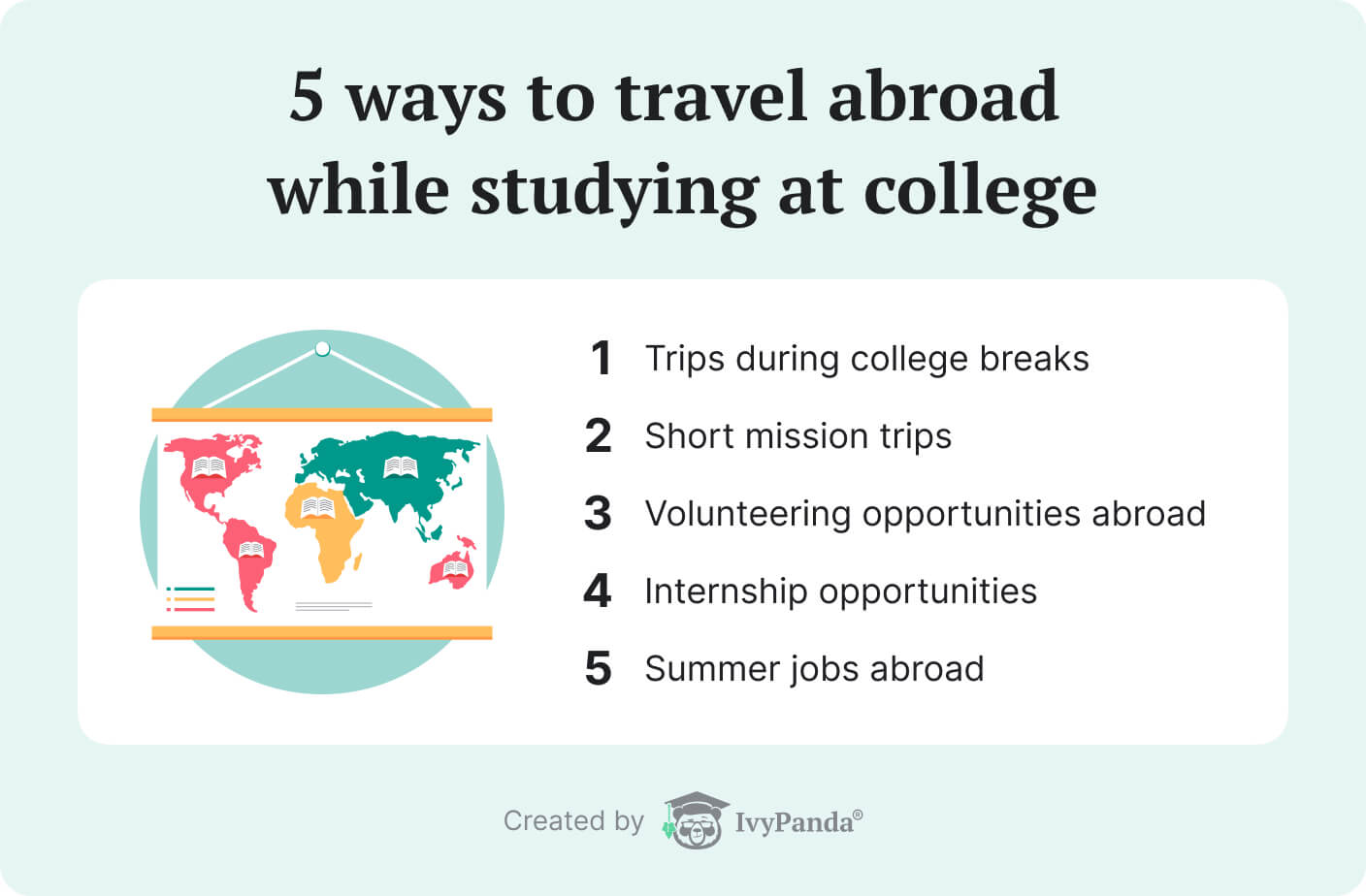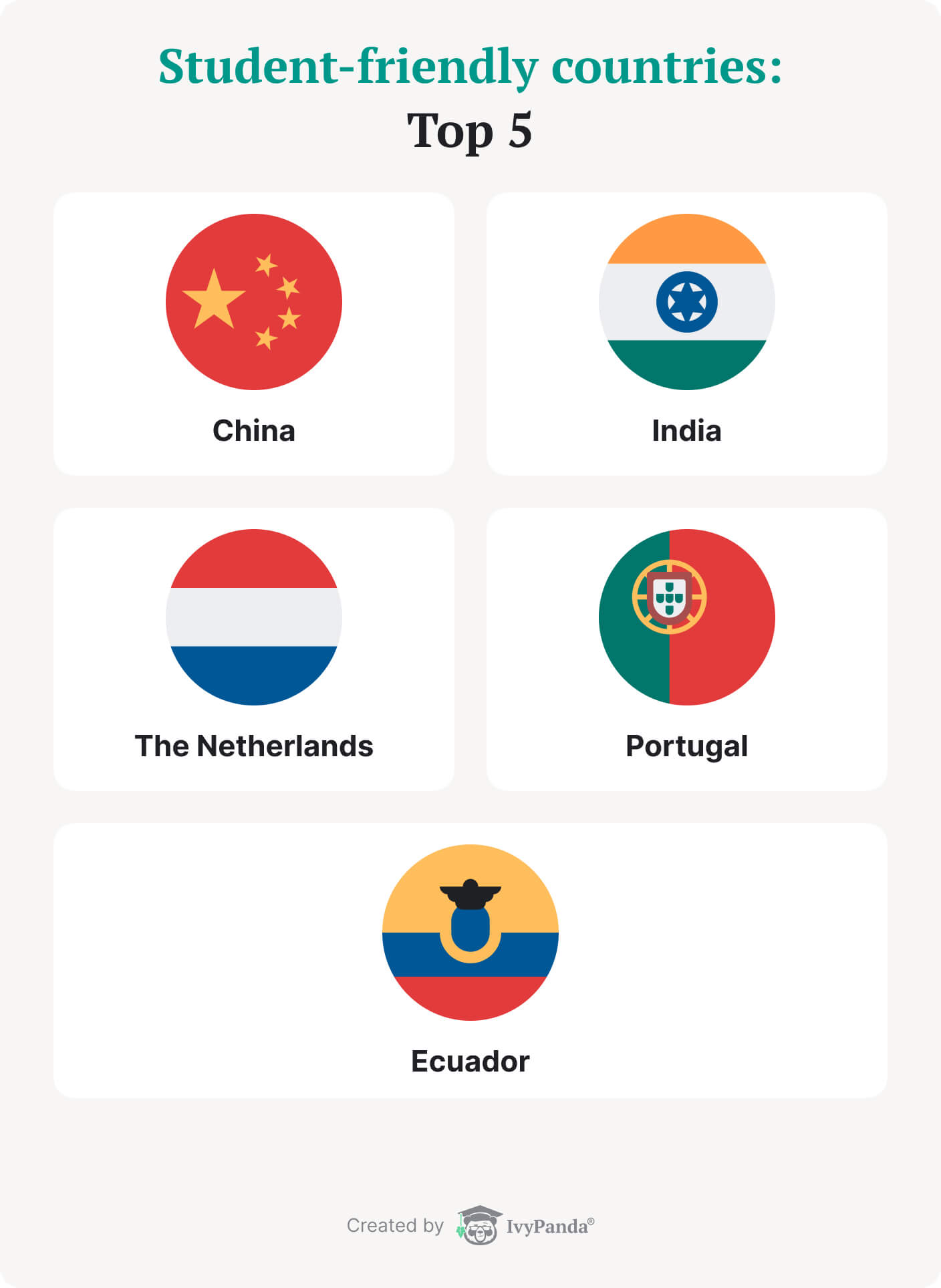As the famous saying goes, “the world is a book, and those who do not travel read only one page.” That’s why so many folks pack their bags and set off on global adventures. It’s not just about seeing new places – it’s also about having thrilling experiences, and learning more about ourselves and the world around us. Every destination offers its own flavor and excitement.

This article will:
- Talk about 5 ways to travel abroad while studying at college.
- Serve up some budget-friendly travel hacks.
- Give valuable advice on how to navigate the world of travel etiquette.
✅ The Benefits of Traveling as a Student
When you’re a student, you want to have fun and make memories that last forever. One of the most exhilarating ways to do this? Embark on a journey.
Why?
Because traveling is a rewarding experience that can change your life.
Venturing into new territories enriches your education in several ways:
- It nudges you out of your comfort zone. Sure, the idea of visiting a brand-new country is thrilling, but you may feel anxious about doing it. Travel pushes you to face the unknown. You learn heaps in unexpected and unfamiliar situations. It can be daunting at first, but things get easier as you figure out how to navigate new environments.
- It widens your horizons. Traveling immerses you in new experiences, introduces you to intriguing people, and lets you explore stunning places. All in all, it makes you more open-minded.
- It boosts your self-sufficiency and confidence. When you travel, you are challenged to do things on your own. Overcoming various obstacles along the way will help you gain resilience, self-assurance, and autonomy.
- It sparks your curiosity. The more you see while traveling, the more you crave discovery. Traveling enables you to learn more about various cultures, languages, and cuisines.
- It enhances your cultural sensitivity and compassion. Traveling makes you more perceptive of other people’s mentalities. It teaches you to shift perspectives and see where someone else is coming from.
- It allows you to get immersed in another language. Living abroad is a great way to learn a new language. You are not only practicing your skills every day but also dive into the culture of that language.
- It opens doors to networking and meeting new people. Each country you visit offers a chance to meet new friends or build valuable connections with folks from around the globe.
- It leads to better academic performance. Traveling is the best teacher. You get the first-hand experience, which is more valuable than theoretical knowledge. This can even improve your grades!
- It hones your communication and social skills. When you travel, you are likely to talk to the locals. You may want to make some new friends, or you may just ask for directions. All this allows you to improve your social abilities and become more confident.
- It leaves you with epic stories to tell. More experience means more anecdotes to share with other people.
- It increases your creativity. Experiencing new things can spark interesting ideas and make you more imaginative.
- It boosts your problem-solving skills. When you travel, you make numerous decisions along the way. It allows you to improve your critical thinking.
- It inspires you. Discovering new places can recharge your enthusiasm and motivate you to pursue your dreams or embrace change.
💸 How to Start Traveling when You’re a Broke College Student
When you are a broke student, you may be thinking that traveling is something you can’t afford. That couldn’t be further from the truth! It just means you need to develop such skills as goal-planning and money-saving. Below is a short plan of what you can do.

- Choose a place you want to go to and make visiting it your long-term goal. This can motivate you as well as give you some time to prepare and think everything through.
- Learn budgeting and money-saving skills. When you’re traveling as a student, it’s essential to keep track of the budget. Before visiting a foreign country, try to calculate how much money you will need for living expenses. Consider things such as transportation fees, accommodation, sightseeing, and food. If you don’t have enough money, start saving up!
- Limit your spending. Here are the most efficient ways to save money while traveling abroad:
- avoid buying things you don’t really need;
- use inexpensive, high-quality food products,
- cook for yourself instead of eating out,
- save your change,
- use students discount,
- reduce transportation costs.
- Create a savings account that is separate from your main bank account. It will help you be smart and intentional with your money. You can also download a budgeting tool such as Budget Planner to keep track of your expenses.
- Find extra ways to make money. Consider a part-time job or a suitable side-hustle. That way, you can get some extra cash and also gain some work experience.
✈️ 5 Ways to Travel Abroad while Studying at College
Sometimes you may think that there is no right time for a student to travel. The summer break is months away, and it’s even longer till you graduate.
Can’t wait to experience new places? There is a way out for you.
Below you’ll find 5 best options for students to experience other cultures while being enrolled in a college.
Just choose the one you like best.

- Self-planned trips during college breaks. Traveling in the off-season is probably the easiest way to visit a country and learn about its culture. It will also help you change your environment and see things from a different perspective.
- Short mission trips. Mission trips are focused on collaborating with local communities. Most of these trips are religious, and you may need time to prepare. You will learn about the ministry experience, practice spiritual discipline, and read the Scripture. If you find these things interesting, then this option may be suitable for you. Mission trips are usually managed by organizations such as Royal Servants, The World Race, etc.
- Volunteering opportunities abroad. Want to go super cheap? Programs such as WWOOF, WorkAway, and HelpStay assist traveling volunteers. They organize work and service trade for students and provide them free lodging. If you join this program, you may need to help with farming, housework, home repairs, event coordination, or childcare.
If you are planning to travel as a volunteer, you need to:- gather the necessary legal documents;
- get familiar with your responsibilities and the project;
- research required and recommended vaccines for your destination;
- pack only essential things.
- Internship opportunities. This is another option that students can consider. Participating in internship programs has some perks, including free housing, subway cards, internship certificate, and free internet access.
It also opens up many opportunities:- It helps to network globally;
- It allows you to live anywhere in the world;
- It provides you with a chance to learn a new language;
- It adds a unique point to your CV;
- It helps you develop communication skills.
- Summer jobs abroad. Taking up summer jobs can also be a great way to get some valuable experience in a foreign country. For instance, you can join a summer camp, teach English, or work as an au pair.
🎒 Practical Traveling Tips for Students
Now, you’re all set to start budgeting and saving money.
But what about the journey itself?
You probably want to know how to make the most of it while traveling on a budget. Well, you’re in luck: we’ve prepared some excellent tips for you on how to plan and prepare for the trip.
- Plan your trip in advance. It’s best to make all the necessary reservations and prepare checklists of the things you want to take with you. Doing so will help you organize your trip and avoid problems and unnecessary expenses.
- Have a dream destination list. In order to see as much as possible, you can make a list of every place you want to visit in your destination. Just think of the museums, galleries, streets, restaurants, and attractions you plan to see and write them down.
- Study the culture of your destination beforehand. When you travel abroad, it’s a good idea to learn a little about the place’s culture and look up some essential words in the dictionary. You will know what to expect, how to behave, where to eat, and what places to visit.
- Book your hotel or apartment in advance. Prices change with the season, and early reservations can save you a lot of money. Try not to waste your time and plan everything beforehand. It will allow you to learn more about student discounts, find cheaper accommodations, and discover more affordable transportation options.
- Get the International Student Identification Card. As a student, you have many benefits. It will be extremely helpful if you learn how to use them. For instance, an ISIC card offers various benefits such as discounts on attractions, museums, and transportation.
- Plan transportation. When you come to a foreign country, you have to navigate unfamiliar places.Consider every option you have: buses, trains, and alternative transport. It’s best to plan your routes in advance and create opportunities for yourself to get off the beaten path.
- Make friends with the locals. Traveling is not only about visiting historical places, but it is also about meeting new people. By making friends with the locals, you can learn more about their culture and language. It’s an excellent opportunity to socialize and become more confident. So, always be friendly, and learn at least a couple of useful phrases in the local language.
🛄 Travel Etiquette [Infographic]
Knowing how to behave while traveling is an integral part of preparation. In some countries, things you consider appropriate are forbidden, and vice versa. This is travel etiquette – a set of codes and rules a person should follow while traveling. Knowing them will save you time and trouble, as well as enhance your experience. Below we’ve outlined some crucial dos and don’ts of international traveling.

🌍 Bonus: Top Student-Friendly Countries
Countries such as France, Switzerland, and Norway can be pricy for most students to visit. If the flight there doesn’t break the bank, then accommodation, food, and tours surely will. Luckily, some countries are accessible, safe, and budget-friendly.

- China. Beijing and Shanghai are two cities in China that are excellent for students. You can find affordable accommodations (around $10 a night) in both cities and enjoy some excellent food. Visiting historical and cultural sites is also not a problem. Day trips to popular destinations such as The Great Wall of China are affordable, and there are many ways to get there.
- India. In India, you will find affordable accommodation and enjoy delicious, inexpensive meals. While flights to India can be expensive, you can easily find inclusive tours and flight deals. There are numerous historical places for you to visit, such as the Taj Mahal and the beaches of Goa. You may also consider experiencing cities like New Delhi and Mumbai.
- The Netherlands. The majority of Western European countries are too expensive for most students to visit. The Netherlands, however, is budget-friendly. In Amsterdam, you can find various inexpensive activities and attractions, including museums, concerts, and clubs. Besides, accommodation is affordable.
- Portugal. Lisbon is a city that is perfectly suited to college students. Why not check out its many historic places? You can also visit Algarve – a magnificent city with beaches, hiking trails, castles, and an ocean view.
- Ecuador. Quito is another city that is ideal for students who travel. It has everything one needs: history, beautiful nature, and delicious food.
To sum up, traveling is an excellent way for students to learn more about the world, gain new experiences, and become more independent. We wish you the best of luck on your future trips!
🔗 References
- For a More Creative Brain, Travel – The Atlantic
- The Ultimate Guide to Traveling When You Have No Money
- How to Travel for Free: 6 Ways to Vacation for Cheap | Time
- Educational Benefits of Travel – Travel Tips – USA Today
- 8 Pieces Of Travel Etiquette Every Tourist Should Know – Bustle
- Travel etiquette: 6 cardinal sins of traveling – Times of India
- Top 20 countries for international students – The Guardian
- The 27 Cheapest Places To Travel This Summer – Forbes
![Traveling as a Student [Guide + Infographic]](https://ivypanda.com/blog/wp-content/uploads/2021/10/traveler-asian-woman-spending-holiday-trip-ayutthaya-thailand-736x491.jpg)


